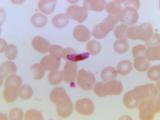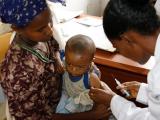Nov 8, 2010 (CIDRAP News) A large clinical trial in Africa has conclusively shown that artesunate is better than quinine for treating severe falciparum malaria in children, which should cement its status as the first-line treatment for severe malaria worldwide, says a large international team of researchers.
A previous large trial showed that artesunate, an artemisinin derivative, was more effective than quinine in adults with severe malaria, but it left some room for doubt about its superiority in African children, says the report published today and an accompanying editorial in The Lancet. But the new findings eliminate those doubts, the researchers say.
"Artesunate should now become the treatment of choice for severe malaria for children and adults worldwide," says the report by a team led by senior author Nicholas J. White of the Wellcome TrustMahidol UniversityOxford Tropical Medicine Research Programme in Bangkok. The study was supported by the Wellcome Trust.
The World Health Organization has recommended artesunate for adults with severe malaria since 2006, but quinine, a remedy that dates back to the 1630s, remains the leading treatment for severe cases in Africa, the report says. The authors estimate that the widespread use of artesunate in African children suffering from severe malaria could save 100,000 lives per year.
The study involved 5,425 children with severe falciparum malaria at 11 centers in Africa, who were randomly assigned to receive either artesunate or quinine, by intravenous or intramuscular injection. In the artesunate group, 230 (8.5%) of 2,712 patients died, compared with 297 (10.9%) in the quinine group. That indicates a 22.5% lower risk of death with artesunate as compared with quinine (95% confidence interval, 8.1% to 36.9%), the researchers say.
Artesunate was well tolerated, and the findings were much the same at all 11 study sites, the report says. The children treated with artesunate were significantly less likely to slip into a coma, experience worsening coma, or have convulsions, though there was no significant difference in the overall incidence of persistent neurologic problems. Another advantage of artesunate was that recipients were less likely to experience post-treatment hypoglycemia (1.8% verus 2.8%; P=.0134).
The researchers say it appears that artesunate is more effective because it has a greater ability to attack different life-cycle stages of the malaria parasite than quinine does.
Dr. Olugbenga Mokuonlo of the University of Ilorin in Nigeria, one of the trial sites, commented in a Wellcome Trust press release, "If half of the estimated eight million children who suffer from the disease annually could be treated with injectable artesunate, we could potentially save 100,000 young lives each year. For those of us who treat malaria in Africa, this trial is a turning point. Finally we have a better treatment to offer."
In an accompanying Lancet editorial, G. Dennis Shanks of the University of Queensland School of Population Health in Brisbane, Australia, agrees that the study dispels the doubts about artesunate's superiority over quinine.
"Choosing the best antimalaria drug for severe malaria has been an important and difficult question. In The Lancet, this question has been answered definitively: artesunate is superior to quinine when both are given intravenously," Shanks writes.
The study authors write that artesunate is safe and simple to administer, whereas intramuscular quinine is locally toxic, and intravenous quinine must be given at a carefully controlled rate to avoid dangerous hypotension. "The ease and safety of parenteral artesunate are important practical advantages," they write, though artesunate is more expensive than quinine.
But Shanks and the researchers say there is a practical barrier to the wider use of artesunate: the drug is not yet available in a form that satisfies international good manufacturing standards. The formulation used in the study, a Chinese product, is the most widely used form, but it does not meet the manufacturing standards, which has prevented its use in some countries, the articles say.
Meanwhile, Shanks comments that the best way to control severe malaria is to prevent it by using insecticide-treated bed nets and treating uncomplicated cases with an oral artemisinin preparation.
Dondorp AM, Fanello CI, Hendriksen ICE, et al. Artesunate veruss quinine in the treatment of severe falciparum malaria in Africa children (AQUAMAT): an open-label, randomized trial. Lancet (early online publication) [Abstract]
See also:
Nov 8 Wellcome Trust press release




















